#slavic roots western mind
Text
Types of dumplings in China
Prior to my arrival to China, I only knew about wonton and jiaozi, which I assumed to similar to pelmeni.
As it turned out, there is no end to the variations of dumplings, so here are some of the most common dumplings in China that I've come across so far!
饺子 - jiǎozi
These are thin veggie or meat filled dumplings, and they can be steamed, boiled or fried but I've only tried the steamed variety so far which is pretty tasty. They somewhat resemble pelmeni, but the tast is noticeably different.
馄饨 - húntún (wonton)
These dumplings are similar to jiǎozi but thinner and they're usually eaten in soup.
生煎包 - shēngjiānbāo
These are slightly crispy, fried dumplings usually with a pork-filling。
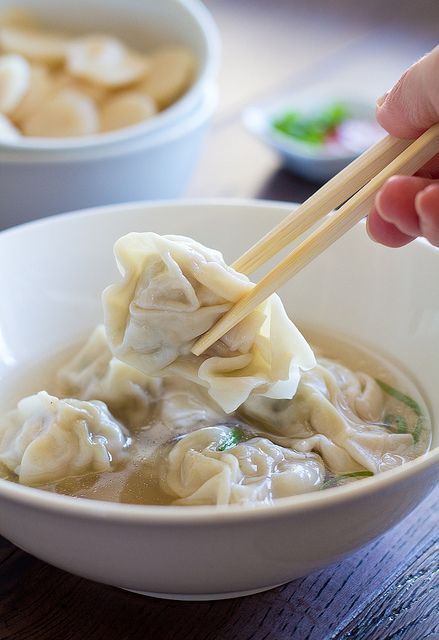
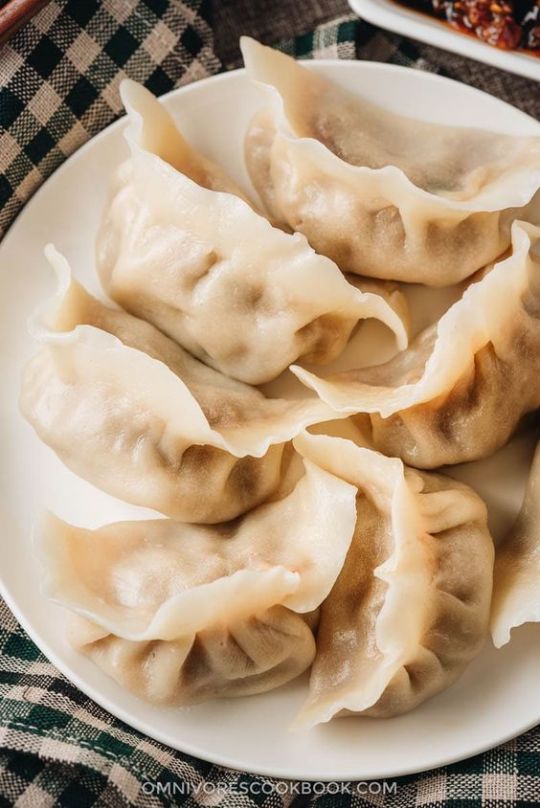
锅贴 - guōtiē
These dumplings are the crispy-ish type, deep-fried and steamed with various fillings like veggies and meat.
水饺 - shuǐjiǎo
They're quite similar to the 锅贴, but these dumplings are boiled (note the 水) without the frying.
小笼包 - xiǎolóngbāo
These are steamed buns, usually filled pork but they can also have other fillings like veggies and seafood.

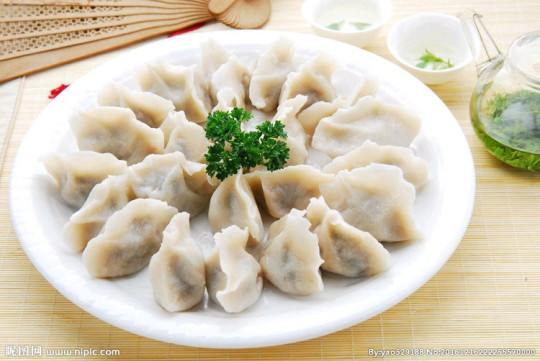

Honourary mentions:
These aren't dumplings, but they're adjacent enough imo.
肉包子 - ròubāozi
These are biggish steamed buns with a meat filling. I have these for breakfast and they're really good.
菜包子 - càibāozi
Same as the ròubāozi, but with veggies and also pretty tasty.


If I missed any, let me know which ones as I'm always looking to try new things!
#chinese food#studyblr#college life#student life#study blog#life in china#aesthetic#student#study motivation#travel blog#china#study in china#college#slavic roots western mind#asia#chinese#dumplings#asian food#jiaozi#baozi#wontons#bao#rou bao#cai bao#cuisine#food#foodpics
199 notes
·
View notes
Text
The Fernweh Saga by @lacunafiction - Davor edition

I-I think Ms. Verner doesn't like him...😳

Davor "Dove" Kovač
🐝 RO: Becca Warrick
Personality: cautious // aloof // pessimistic // flirtatious (only towards Becca ...and Reese??)
Traits: head // independent // resistance // believer
Past affinity: math
Primary ability: extrasensory awareness
Past susceptibility: forward.
'it’s better to push forward. don’t look back on the past when you have new places to be and things to achieve.' <<< his motto

🕊️ Fernweh: Davor lived a happy life there and didn't think about leaving in the future. Maybe for some trips, but he knew it would always be his place, his safe place...
'It was a mistake to come back here.' - that was his first thought when he tried to fall asleep on the first night in Fernweh. The nightmares came back as he thought they would. He wants to leave as soon as possible because he feels that it is not safe for Becca to be here.
🕊️ Gramps Dan: That was his gramps who taught Davor how to play the guitar. As a young child, Davor always admired him and believed he was the most intelligent person in the world.
After the death of his parents and how his grandfather treated him, he was devastated and angry. He wanted answers soo badly but didn't get any. He lived loathing his grandfather ever since. The news of his passing stirred up a lot of negative emotions that Davor had previously managed to suppress. At the beginning of the story he couldn't care less about his grandfather, but because of his journal he started to believe him. Things that his granfather lived through made Davor even more angry at this messy town …but he's willing to forgive his gramps…
🐝 Becca Warrick: It was a ...funny story that brought both of them together and they look after each other ever since. He considers Becca as his precious (not in a negative-possessive way) treasure, he literally can't let anything bad happen to her. That was also she who came up with the nickname 'Dove'... (and she's literally the only person who calls him that, others wouldn't dare...). He had feelings for her for quite some time but didn't act on it... until now.
Although he didn't express it, he felt very nervous about Becca being in the town where he grew up. He was curious (but also scared) about what she could think of this town. He felt like he was revealing more of himself to her…. and he forgot about any worries pretty fast, because the town started being weird as fu--.
🕊️ Reese Verner: Back then Davor was quite cheerful and enjoyed competing with Reese regularly. They teased each other a lot. Davor always thought that Reese had a crush on him, was it true tho? donut know, but he certainly had.
...why does he appear in his nightmares? Maybe the crush stage never disappeared...? Seeing him again was a nice experience, sure... but ignoring the circumstances, he is still unsure if it was worth it and is struggling with his thoughts… Would it be worth it to return to Fernweh just to see him... again? welp, good thing he doesn't have to think about it much, am I right?
🕊️ Sofia Dorran: The two of them maybe did not have a strong relationship, but he knew Sofia is the ideal person for engaging in intelligent conversations. He enjoyed spending time with her, solving the puzzles that gramps created for them both. Davor wasn't a fan of fantasy books, but she managed to change his mind about them.
Davor knows that Sofia did take good care of his grandfather, but he still doesn't quite know if he's grateful for that or wished she spent her time more... valuably... He was tempted to ask Sofia to borrow that book she found in his grandfather's bedroom, but he thought better of it. It's better to leave Fernweh… Even so, his curiosity wasn't properly fed.
🕊️ James Corvin: Maybe not brothers by blood, but definitely brothers by choice. Davor treated him as if he was the brother he always wanted to have. Back then Davor always placed a high value on his family… until now. At the time, Davor tended to be more impulsive and James was usually the one who kept him from getting into trouble (which often involved Reese).
It was really hard, for both of them, to see each other after so long. Their first interaction was pretty awkward... I would even say that most of their interactions were . James noticed how Davor changed the question is: for the better or worse? I don't even know. Everyone can sense, that things around them are different now, and they aren't as close as before. Will it change?
🕊️ Alek Corvin: …To say that Alek wasn't a fan of Davor would be an understatement. Was it because James spent most of his time focusing only on Davor trying to get him out of trouble? Did Alek observe any possessiveness from Davor towards James? Or maybe simply because of the bond between those two, which was truly something that others would envy and desire? Davor never considered it, especially when he left Fernweh permanently. :))
As you can imagine, Alek doesn't seem very happy about Davor's return… But he took an interest in his new friend, Becca, which did not go unnoticed by Davor and he isn't really happy about it.
🕊️ The Waitress: Oh boy, it seems that Davor has taken up a new hobby, which is glaring harshly at the waitress. He finds her mistrustful and he smells trouble. Had they met when he was younger, there may have been a slim chance of them getting along.
🕊️ Waffles!: So um… Davor has a little issue with dogs and because of that his relationship with Waffles isn't as wonderful as I wish it would be... However, I believe that with time and help from Becca, they will eventually become friends.
#actually about his scar i have this whole headcanon... featuring some...umm.. doggos and Becca... 👀 especially how they met#(Davor was always team cats but after that incident even more xD)#also ouch that naming scene it hurt me so much! but i get it ;; aaaa! Davor why are you being so problematic Waffles is wonderful!!!#it was really interesting for me to messing with Davor in nightmares and showing him Reese!! the feelings the emotions aaaa#also yeeaah Davor thought several times if it would be a good idea to come back to Re-- *cough* Fernweh... and then Becca happened...#generally speaking Davor has a keen interest in Slavic mythologies and culture particularly those from western and southern regions of-#-Europe. I imagine that his father has roots in these regions and he took great pride in his heritage. Often taking about it to Davor#...and since Sofia's a smart girl she lent Davor a fantasy book written by Slavic author who took a great inspiration from Slavic myths👼😊#yes it was enough to change Davor's mind about fantasy books XD he never really read one before he just assumed it's BORING!#and now I'm sure he will throw questions at Sofia about this book she found even more since he's staying at Fernweh... I can imagine how-#-they both are staying up late studying it and comparing their notes... it would remind Davor about the time they were kids-#-it seems that his Gramps gave them both the last puzzle to solve... will they succeed?#and ooohh that will be a hard time for James and Davor... that rejection at the end of book one wont help them im sure XD#about Davor's 'possesivenes' over James... Davor was needy that's true but he would never think about 'stealing' James from Alek or-#-'claiming' James belongs to him. I hope im not crossing a line here but in my headcanon Alek was TOTALLY jealous over their friendship#and Alek THOUGHT that Davor was receiving more attention from James 👀#//which obv isn't true because James would never allow it. Alek is always a number one in James' heart//#in mine too I love A!!!! 💖 they're a BABY#but i must say that Davor didn't really think about Alek's feelings back then. he wasn't aware how Alek could feel- that's not an excuse#super curious about book two and how his relationships with every single one of them will develop!!!#fernweh saga#oc: davor kovac#no i totally did NOT change his surname..
46 notes
·
View notes
Note
💌 Send this to the twelve nicest people you know or who seem to have a good heart and if you get five back you must be pretty awesome. 💌 🤭🤍
🥹🫶
1 note
·
View note
Text
Nine People I'd Like To know Better
@alby-noted tagged me so I figured why not!
Last Song I Listened To: Too Sweet by Hozier or Pink Venom by Blackpink, I don't necessarily remember
Currently Watching: My Demon, Avatar The Last Airbender (Live Action), and I want to start watching Shogun and a Spanish tv show soon!
Sweet/Savoury/Spicy?: Savory and Spicy!!! (my favorite indulgent meal is spicy cheesey ramen!)
Relationship Status: about to hit 2 years with my man that I've been long distance with for the last...8 months? I love my boyfriend <3;
Current Obsession: watching study/productivity youtube videos, specifically studyquill, The Bliss Bean, Study To Success, Mikayla Mags, Lindie Botes, etc (and also being efficiently productive)
No pressure to anyone I tag! much love 🩷
@mystudyrecords @study-diaries @tokidokitokyo @gretheresa @zzzzzestforlife @slavic-roots-western-mind @winryrockbellwannabe @wonyoungismind @alcnek
I tagged people I'm mutuals with since I don't really know anyone here (besides maybe my accountability buddy zesty!)
#pink pilates girl#pink pilates princess#self development#wonyoungism#it girl#college studyblr#studyblr community#studyblr#japanese studyblr#spanish langblr#langblr#japanese langblr#college studyspo#language study#study motivation#study notes#study tips#studying#studyspo#language studyblr#study aesthetic#study blog#study community#study mood#that girl#pink academia#pink aesthetic#university student#uniblr#uni student
120 notes
·
View notes
Text
Nine people I'd like to know better
I was tagged by @quatregats 💖
Last song: Bad Habits by Ed Sheeran
Favourite color: purple (currently wearing an all-purple outfit 💜)
Currently watching: Downton Abbey
Spicy/savory/sweet: savory or (not too) sweet
Relationship status: single
Current obsession: none actually, it's been a while since I've had one 😕
I tag @fluencylevelfrench, @lemonadeandlanguages, @marilearnsmandarin, @mediocrelanguagelearner, @pawprintedpages, @ruhua-langblr, @segledepericles, @sprachgefuehle, and @slavic-roots-western-mind (no pressure!).
53 notes
·
View notes
Text
Pathologic and the Town's Russianness: 1
For part 1, let's explore the naming conventions Pathologic uses, and whether its Town characters have Russian surnames.
The names of the townsfolk are remarkably non-Russian
The Kin, of course, have their names in their own Steppe language, which is a conlang that Ice Pick Lodge conscructed based on Mongolic and Turkic (mostly Buryat) tongues. So, no questions with that.
But what about the Town itself, and the names of the people living in it?
For starters, it must be noted that the foundational workings of surnames in Russian are pretty much the same as in most European languages: a surname denotes someone's ancestor's relation to craft (such as the most common surname both in English - Smith, and in Russian - Kuznetsov, meaning exactly the same), kin, appearance feature, or other such concept.
As an inflected language, however, Russian adds special suffixes to its usual roots to arrive at surnames. The most well-known of them is, of course, -ov. In the example above it turns kuznets (smith, as an occupation) into Kuznetsov (Smith, as a surname). It is also used to form the archetypical Russian surname: Ivanov, that is, related to Ivan. It is, however, by far not the only suffix used, and there are multiple others: -in, -tsyn, -shyn, -ev, -tsev, -y, and more.
Most of these allow to construct feminine forms by simple addition of the ending -a (Saburov - Saburova); but some are more complex (Olgimsky - Olgimskaya). Such complexity usually marks suffixes used in other Slavic tongues: -y in particular is often seen in Belorussian and Polish.
With all that in mind, let's explore the names we find in the Town-on-Gokhon. And the thing immediately striking is just how little surnames formed from Russian roots and Russian suffixes there are.
First, there are obviously non-Russian surnames, such as Ravel, Block, Longin, Feugel, Yan, Croy. Most of them appear to come from other European languages.
Is that probable for a Russian Empire stand-in? Yes. It was a multinational state, and there were enough Europeans among the elite for Vyazemsky to bemoan in mid-XIX century that "the Russian God" is "God whose favour falls on Germans". (Then again, hardly surprising under the Holstein-Gottorp-Romanov dynasty, ethnically German and only taking German wives for generations, despite ruling Russia).
Then, there are the surnames with Russian suffixes: Saburov, Stamatin, Lyuricheva, Olgymsky, Dankovsky. But the thing is, none of these have Russian roots! Saburov is based on Tatar (patient, hardy); Stamatin on Greek (persistent, stable); Lyuricheva, Olgymsky and Dankovsky are Slavic-sounding, but appear to be unique to the game's characters. As a side note here, Dankovsky is apparently based on a name from Gorky's Old Izergiel (Danko, a brave who ripped his own heart out to light the way for the rest of his peope).
Now, is that probable? It's stretching the suspension of disbelief a bit. Yes, there had been Tatars among the Russian elite since before the day Kazan was conquered by Moscow, which reflected in their surnames. Yes, priesthood surnames could include Greek roots. And yes, the Western Slavs were also in the Empire. But it's hard to imagine all of these coinciding to entirely drown out the surnames based on Russian roots!
All in all, this distribution sounds like a conscious artistic choice, making such an assemblage less likely for historic Eastern Europe rather than Central one.
As a sort of postscript, for these who could be bothered to read this far down. There's an interesting quirk about the female surnames in the game: in Russian, unless a surname ends with one of the Russian suffixes, it retains its basic form (same as the masculine) even when women use it. Thus, Lara's surname is Ravel, same as her father's; same thing with Croy. But there's a curious exception: the Kains. Their surname is obviously based on the eponymous Biblical character, Cain. The only thing is, Cain is not a Russian word, and thus the women of the family should apparently still have the surname Kain. Yet they do not, they use Kaina - which suggests that their surname uses the Russian suffix -in: just someone related to something called Ka-, perfectly normal, totally a word, no primordial killers in sight.
Whether that is simple wordplay, a way to show the lineage deeply assimilated, a way to take the focus off the Biblical relation, or anything else, is up to the reader to decide.
31 notes
·
View notes
Note
Just because an edition of a book is written is rewritten doesn’t mean every copy is being changed. A “gender neutral” version of a book doesn’t mean the book itself no longer has any worth, nor does it mean the culture that created it is worthless. Sure, liberals are being stupid and changing certain editions of books but that doesn’t mean “Western civilization” is coming to an end or that its historical accomplishments deserve to be erased. Just because some idiot made an “inclusive” version of a book doesn’t mean you should purge centuries of creative achievement and literature.
Bro, look at the tags under my posts. There is a keyword at the end that describes the type, mostly: Flash Fiction. I use this to outline short ideas in a few sentences or words, a purely mental testing ground, mere mind games aiming for a better future.
—
But to address your objection:
Of course, the old unadulterated editions persist. However, the way it works is that libraries replace it with the new one and over the decades the old editions become fewer. There is officially no censorship in the West, but there is an extremely large amount of self-censorship (thanks to political correctness).
I myself see our current culture and civilization in general quite radically different: From my point of view, we have been completely distorted for centuries anyway, whether by the church or some secular rulers. The question is what else is authentic about our culture? I guess not much! And then there is the profound question: What are our authentic roots?
Above all, our entire view of history is bullshit from the start, cobbled together fantasy of Jesuits and humanists. And these collaborative mere fictions have spawned whole fantasy nations with their own fantasy languages and fantasy culture across Europe in modern times. When I became aware of this, my willingness to make a radical break was fanned: So instead of bemoaning the lack of authenticity and looking for the remnants of unadulterated originality in our culture that probably no longer exist, we should rather consciously decide on a new synthetic culture that combines the best according to our androphile worldview as bros.
If most of us don't see it as a loss to just let some old books full of effeminate tales to rot, then so be it. Total commitment to masculinism as a radical counter-response and correction also requires male destructiveness, the cultural wrecking ball thanks to which future generations of bros will no longer be corrupted by false or just unmanly images.
—
Most European nations are artifacts of modern times
Most nationalities in Europe are the product of sheer politics, as a ruler decided to secede along with his subjects from a larger nation. A local dialect was then artificially elevated to an independent national language. For example, Dutch is basically just a Middle High German dialect that was promoted to become its own national language a few centuries ago. But the differences are not much greater than between Bavarian and Standard German. So the Dutch identity was primarily a political thing.
Other European languages have actually been constructed. Today's Italian emerged in the 19th century as an academic work created at Italian universities, and in the course of modern media and Italian nationalism displaced the local dialects, which were clearly different; in the north, for example, much more Germanic (by the Lombards and Goths). But today people act as if all of Italy had always spoken this language modeled after a roman fiction.
In Eastern Europe it is even more extreme: The whole Slavic language family is a construction, created as "Church Slavonic" by Byzantine monks in order to proselytize the wild pagan tribes in Eastern Europe under a uniform language. Later, missionaries from Kievan Rus brought their weird language to the Balkan region, giving rise to Serbo-Croatian.
All I want to say with these examples is that culture, which includes language in particular, is a thoroughly arbitrary result. If, for example, the Turks had conquered Vienna, or if the Franks had failed to stop the Arabs coming from the Iberian Peninsula, Europe would look very different today. All churches at that time, which were mostly built on pagan places of worship, would then have been converted into mosques and the previous culture would have entered the new one at best as a substrate, just like the original language.
I think it's important that we bros recognize and understand that, so that we don't cling to the old when it doesn't fit well.
2 notes
·
View notes
Text
Desserts in China
There's quite a large variety of treats and desserts in China (more than you can imagine), so here are some of the most common ones!
Almond jelly/tofu - 杏仁豆腐 - xìngréndòufu
Despite the name, almond jelly doesn't actually have almonds in it. Almond jelly is made from gelatin and almond milk, although some recepies use dairy milk instead.
Glutinous rice balls - 汤圆 - tāngyuán
These rice balls are made from glutinous rice balls with a sweet filling, such as red bean paste (a pretty popular filling in desserts, I've been fooled more than once when purchasing what I assumed to be a chocolate filled pastry).
Red bean buns - 豆沙包 - dòushābāo
One of my favorite desserts so far. These are steamed buns with a sweet red bean paste filling that I'd definitely recommend.
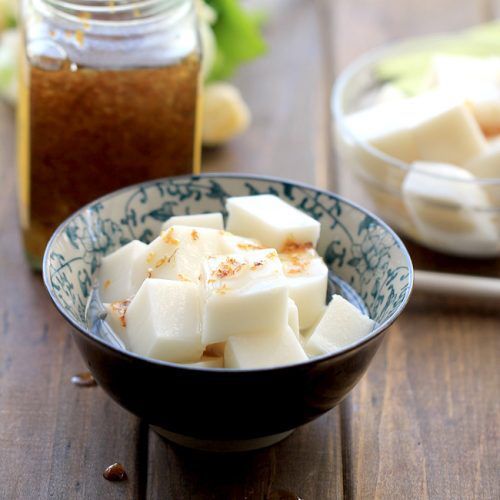


Egg custard bun - 流沙包 - liúshābāo
A sweet and savory bun, with a lava-like egg yolk filling. A pretty interesting dessert, as it's both sweet and savory.
Pumpkin cake - 南瓜饼 - nánguābǐng
I haven't tried this yet, but it definitely looks good. A fried and crunchy cake with a sweet filling such as red bean paste.
Eight treasure rice pudding - 八宝饭 -bābǎofàn
This is a pretty popular dessert, especially during the Lunar New Year. It gets this name becase of the toppings, which are eight or more different types of dried fruits and nuts arranged on top of the sweet rice, with (once again) red bean paste.


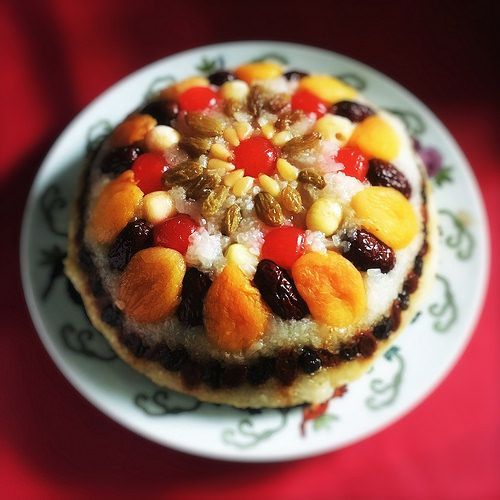
Hawthorn stick/ Candied Haws/ Sugar coated haws/ Bingtanghulu - 冰糖葫芦 - bīngtánghúlu
This treat has quite a few translations and you may have probably already seen it. This is basically candied fruit covered with a sweet, crunchy and sugary syrup. Traditionally, Hawthorn is used but other fruits such as grapes, strawberries and oranges are also popular options.
Sachima - 沙琪玛 - shāqímǎ
I haven't tried this snack yet, but it looks quite fascinating. Sachima is made from fried batter stuck together with a sugary syrup, with an interesting texture.
Sesame balls - 芝麻球 - zhīmaqiú
Similar to the rice glutinous balls, this treat is also made from glutinous rice flour with varying fillings including lotus seeds, mung bean and red beans, and sesame seeds.
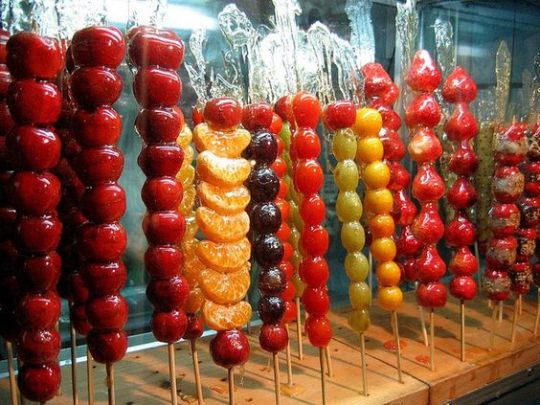
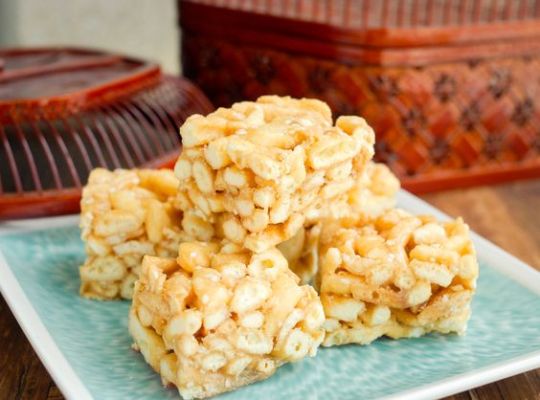

Water chestnut cake
A sweet pan-fried cake made from chinese water chestnut, with a unique semi-transparent appearance.
Wintermelon puff/ Wife cake/ Sweetheartcake - 老婆餅 - lǎopóbǐng
This cake has many names, mainly because it has several different origin stories, each more fascinating than the next. This dessert is a flaky pastry with wintermelon, almond (not red bean this time!) paste and sesame filling.
Fortune cake - 发糕 - fāgāo
Not a fortune cookie! This is a spongy steamed cupcake cake
commonly made for the New Lunar Year celebrations and occasionally other events. They're usually a white-ish or brown-ish color, but they're often dyed bright colors to add extra festivity.
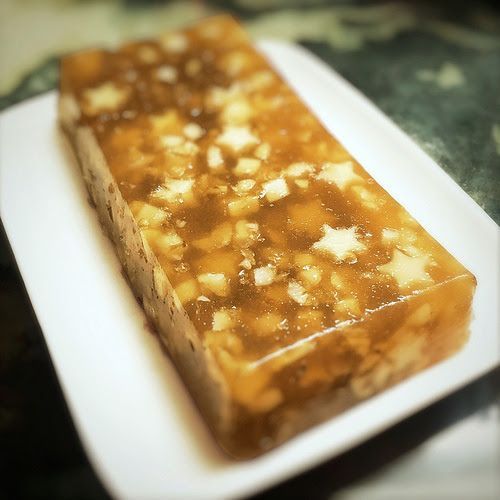


Mooncake - 月饼 - yuèbǐng
This is a pretty well-known dessert, commonly prepared for the Mid-Autumn Festival. Mooncakes are smallish steamd/fried (depends on the region) cakes with a sweet filling that can also sometimes have an egg yolk inside.
Osmanthus cake - 桂花糕 - guìhuāgāo
This is a unique traditional pastry made from glutinous rice flour, honey and osmanthus. This cake has a really interesting texture, as it's quite dense but also airy in a way? I'd definitely recommend trying it, as it's not super sweet and goes really well with tea.


#chinese food#studyblr#college life#student life#study blog#life in china#aesthetic#student#study motivation#travel blog#china#study in china#college#slavic roots western mind#asia#chinese#asian food#baozi#bao#cuisine#food#foodpics#red bean bun#red bean paste#almond jelly#rice balls#chinese dessert#chinese sweets#asian desserts#asian dessert
175 notes
·
View notes
Text
“Fantasy Names” for Non-English Languages; One Language Per Continent?
@corrupted---minds submitted:
In my story there are different continents inspired by sections of our world; fantasy Europe, fantasy East Asia, fantasy Middle East, ect. And each continent, for convenience, speaks one language. Cantonese is fantasy East Asias language, for example.
Now on to naming conventions. While in fantasy Europe people have average european names, about 30% have fantasy names like Illumina or Crystal or Raten Firewalker. I want to try to keep the same naming ratio for the other continents, but I’m not sure if it would be offensive for me, as a white woman, to cut apart a language to make a cool sounding name for my characters that are POC.
If you have any insight, suggestions, or just flat out think it’s a bad idea, please let me know. I dont want to unintentionally offend anyone.
On the Issue of Worldbuilding
The salient point is to avoid using languages from real life outright. Already, I sense that your language and coding categories are too broad. It’s never a good idea to reduce such large regions containing so many ethnicities to a single language group/ setting. Think more granular and use single ethnicities instead. Rina has already written on naming conlangs, including pertinent resource links, that I think would be very helpful information for you. Please read her comments here.
Furthermore, as a reader, I think it is more realistic and dynamic when the characters have names that mean something in their own languages. Most people already have such names IRL. I think in many Western cultures, some are simply too removed from the original root languages to know the word origins of their names. My pen-name here on WWC happens to mean “Jasmine” both in Sanskrit and Japanese, but Marika is a lot more culturally relevant than “Jasmine” as it expresses my bicultural identity much more effectively. Thus, I am curious as to why you wish to stick to this arbitrary 30% rule. Not only does it strike me as rather boring, but it also generates a lot of dissonance for me as a reader in conventional fantasy when a person “randomly” has a conventional fantasy name with no context given.
If people are given atypical naming schemes, I’d much rather there be a sensible reason for this choice. It both provides context and lays the groundwork for world-building information that the reader can draw on unconsciously at a later time. For example, as I continue my role as this blog’s Tamora Pierce evangelist, the author has two such examples of atypical naming in her universes. In the Tortall series, the Shang warriors are given titles that reflect their prowess, with more legendary animals indicating higher levels of mastery. Thus, the reader automatically knows that Liam Ironarm, the Dragon, and Kylaia al Jmaa, the Unicorn, supersede Ida Bell, the Wildcat, and Hakuin Seastone, the Horse, in terms of skill. In the Emelan Universe, dedicates of the Living Earth religion choose names associated with plants, animals and natural phenomena ( e.g. Rosethorn, Frostpine, Moonstream) and lack last names. Academic mages, on the other hand, have last names that demonstrate what kind of magic they are proficient in (Goldeye, Ladyhammer, Glassfire), allowing us to immediately discern who is a dedicate in the Living Earth faith, who is an academic mage, and who is neither (whether they be from a different background or are still in training).
Lastly, as a caution, we would like to warn many of our readers that words commonly associated with imagery used in Norse mythology are now often dog-whistles or outright references to white supremacy groups/ movements (Thanks Neo-Nazis!). Thus, particularly for white/ Western-coded characters, please check any name meanings against the following databases created by Southern Poverty Law Center and the Anti-Defamation League (viewable here and here).
- Marika.
On Colonial Implications
I would like to emphasize how flattening it is to summarize any large region down to a single language: British Columbia and some of Washington State have 7 mutually unintelligible language families within a few hundred square miles. That’s an incredibly saturated amount of linguistic diversity in a very, very small region. And it’s not the only linguistic hotspot in the world.
Europeans often have an artificial sense of how many languages are natural in a region, because Europe is one of the least linguistically diverse regions in the world at about nine language families, with 94% belonging to a single language family. Meanwhile, China alone has at least nine families, and India has at least six. In North America, you have dozens if not hundreds of language families across the continent.
Note that these are language families, not languages. Each language family can have anywhere from 2 to 50+ languages within it. The aforementioned language family with 94% of Europe is Indo-European, which covers everything from French (the Romance branch) to Punjabi (the Indo-Iranian branch) to Russian (the Balto-Slavic branch).
Convenience should not come at the expense of linguistic diversity. Language destruction is one of the targets of colonialism, and doing such a flattening would leave an extremely sour taste in my mouth at the implied history of this world. Many, many Indigenous languages are extinct because colonial languages were forced upon the populations of the Americas (English, Spanish, Portugese, French), and this isn’t counting non-European colonialism.
Widespread single languages across huge landmasses often come with an extremely bloody history (unless it was purposely crafted for ease of communication among groups, such as Plains Sign Language), and for your marginalized readers it will be unignorable. You don’t have to create a continent’s worth of languages, but you do have to acknowledge the diversity is there.
As Marika said, focus on individual ethnicities instead of such broad land masses. Doing your current track would pull anyone with even an ounce of linguistics education, or anyone who has had their access to language suffer because of colonialism, right out of the story.
~ Mod Lesya
I agree with Mod Lesya, especially when it comes to their point of language destruction being one of the targets of colonialism. East Asia already has a history of this, with languages being banned and punishments for speaking them, and even now in mainland China Mandarin is being pushed as the only dialect to speak vs. Cantonese, Hokkien, Sichuanese, etc. A suggestion I have is to perhaps have one common language for diplomacy/trade purposes that is used alongside other languages and dialects in certain regions.
--mod Jess
450 notes
·
View notes
Text
thx @ghiblilesb for that tag!!
last song: and one - dancing in the factory
favorite color: pastel lavender
last movie/tv show: I started watching journey to bethlehem last year but couldn't finish bc of my workload tsk tsk....
sweet/savory/spicy but at this moment im craving croissants тот
last thing I googled: kalpalata farm route... i hate genshin for this
current obsession: yuzuru hanyu
last book: reread phantom of the opera for my course paper 100/10 experience
looking forward to: finally relaxing after this semester whaddahell my 9 days break starts tomorrow yippee!!
tagging with no pressure obvi: @slavic-roots-western-mind @dinosaurguts @osondu-imafidon @desmoonl @khalixvitae and anyone else who wants to join in
120 notes
·
View notes
Text
EUROVISION 2021, personal favorites:
- Russia 🇷🇺
Manizha, Russian Woman: Absolute favorite. The sheer originality of the song! Her energy and the level of absolute badassery! She can sing, she can rap,and she's a bomb of energy. The way reggae and brass and hiphop and Slavic melodies overlap and it somehow works, the transitions between fun and "I'm bitter about the sexism and I'm mocking it unapologetically and making a stand" and the anthemic, emphatic and powerful message to Russian women; I was swelling with emotion while watching her. While to an American or a Westerner it may seem like performative feminism, I'm gonna remind you that in Russia and other Slavic countries that's very much not a thing and actually a very unpopular stand to make, and in Russia, The Balkans, and Eastern Europe in general, hundreds of women face domestic and sexual abuse on the daily, and those who do come forward rarely get support and are mostly dismissed. Let's not forget that Manizha got a huge backlash from the Russian government officials, and a big part of it was for her Tajik roots. The honesty of her message is real, and she's speaking from personal experience and the experience of women around her - nothing performative about her song, and you can tell from her delivery that the fire within her is true and she leaves her heart on the stage and pours it into the song. The staging and costumes are great as well, and symbolically well thougt-through. I would really like her to win, or at least get to the top 5. Most of all, I hope her message is heard and felt. 10000/10
- Italy 🇮🇹
Måneskin, Zitti e Buoni: definitely the closest thing to my actual music taste this year, so liking them off the bat wasn't a surprise. However, they're not just your regular Franz-Ferdinand-ish young alt rock band that wants to do rock "properly" - they have IT. The X factor, the Je ne sais quoi. I've been exposed to that particular genre, and I can confidently say that the song still manages to be refreshing and original (that bridge, those riffs!) The band has a great energy and no matter how much Damiano steals the show, they are still a unit and nobody is left in the shadows. They have the spirit of great rock bands of the previous century, and yet they don't try to copy anyone (khm,Greta Van Fleet, khm). Damiano's vocals are both powerful, seductive and provoking, and I'm still admiring the sheer amount of emotion he can pack into a single line and the nuance and yet rawness behind it. I'm not gonna state the obvious lol (the obvious being yes, I'm thirsty as well, he becomes yet another unattainable rockstar for me too,and yes they all look great) Anyway, great song, and maybe the clearest and most serious candidate for the number one spot, taking both the jury and the public into consideration. 10/10
- Iceland 🇮🇸
Daði Freyr and Gagnamagnið, 10 years:
What can I say about this masterpiece that hasn't already been said? A clear fan-favorite (hi, Valentina), but with the guns to back it up. The song is contagious, fun and campy, and unlike some other songs with said qualities, actually good from a musical perspective. Daði is incredibly charismatic and his sense of humor shines through, and even though he's the star of the show, the same can be said about the other band members. The synergy Måneskin has can be applied to Gagnamagnið as well, even though the energy is entirely different. They're serving us fun, sunshine, kitties rainbows sugar spice and everything nice, and manage to do it with zero cringe factor (plus those funky keytars). I'm one of those Eurovision fans that lament the golden age's (2004-2009) campiness (We'll never forget you, Verka), and Daði managed to bring it back, but modernised, polished and still sincere. I personally preferred the epic dad joke that slightly more commercial Think About Thing was (but that's one tough act to follow), but I'm always down for a husband adoring his wife and singing praises to their relationship. Since we're on tumblr, I feel obliged to use the term "cinnamon rolls" in describing Daði and the band. 9.5/10
- France 🇫🇷
Barbara Pravi, Voilà: She brought the theatrics, she brought the drama, and she brought the 101 in "that's how you perform". Her personality leaps through, and her voice is both beautiful and full of emotion and power. I'd hire her to star in a serious and artistic movie. Despite the fact that Voilà is from its melody to the singing style to the video to the vibe and the aesthetic hands down the most French thing I've seen since Amélie (do not come for that movie), it miraculously doesn't come across as a cliché, but rather an homage, and an individualistic one at that. It's not entirely my cup of tea, since I'm usually biased to songs that may come off as snobbish (I mean, the jury is going to lap it up), and are all about being proper and technical and oh how ~artistic~, but Barbara puts the soul into the immaculate. I'm not giving her the highest mark because I'm yet to see the performance, but I'm rooting for her. If she delivers the performance, we might have a clear winner. 9/10
- Ukraine 🇺🇦
Go_A, Shum: I'm a sucker for all things ethnic and mytological, so this was a no-brainer. I want that song played at every party. I want to go to the forest in the video and chant and summon the spring with flute and hard-bass. Kateryna Pavlenko has some unexplainable power over me, and her eyes are simply hypnotizing. The vocals are great, proper Slavic ethno right there (seriously, check out Slavic folklore and traditional music), and she has a subtle punk quality too(?). Ukraine came to save the spring and make us forget about the pandemic, and minus the Maruv fiasco (justice for her!), they always deliver and I expected nothing less. On the other hand, I loved the original version much more and couldn't help but be a bit disappointed with the revamp (yes, I know they had to), and while I personally love Shum, I think some other acts are more deserving of the higher placement. Go_A are not my winner, but definitely soon to be in my playlist. 8/10
- San Marino 🇸🇲
Adrenalina, Senhit ft. Flo Rida: You know that golden age of Eurovision I mentioned? THIS. I'm Serbian, so I can't resist a banger reminiscent of our horrible turbo-folk elements (and I say that endearingly,takes me back to 18th birthday parties (boy I'm glad that's over)). Let's just crown Senhit this year's Queen of Camp. The wild factor of Flo Rida...just?? Amazing. Can't wait to see how the performance goes (EDIT- it went great, I had a grin on my face the entire time and couldn't help but dance along). A certain refreshment after Serhat and Valentina Monetta endless loop. They didn't dial down the weird, but made it catchy af, and the vocal can rival any Balkan folk diva. While I think it's definitely the most entertaining entry this year, it's far from being the most original, and it's not really my genre of preference. Will vote for Senhit and root for her to qualify. 7.5/ 10
- Sweden 🇸🇪
Tusse, A million voices: As I mentioned before, I'm the first person that starts complaining about Sweden Superiority as soon as Eurovision season begins, and I'm with you all with being tired of Sweden qualifying just because they're Sweden and usually just bringing the same brand of MTV/Calvin Harris/American pop, or a successful and not-so-subtle imitation of the performances that did well the previous year,but listen: A million voices is a solid pop song and I'm going to die on that hill. It actually embodies the essence of pop - a catchy, pleasant melody sung by a good vocalist, with a short,sweet and uplifting message. It's not the same as previous years, it's not commercial, just good pop - good pop being something you immediately like and vibe to no matter how many common elements of the genre it checks. It relies on RnB rather than electronic sounds, auto tune or various DJ effects. Tusse is charming and charismatic af, and he's a 19yo kid doing an amazing job on a global stage. You don't have to like it, but there's no need to hate on it (ask Jendrik). Imo, Tusse deserved to qualify. Not winner material yet, but I wish him a fun time and a successful career. 7 5/10
- Switzerland 🇨🇭
G'jons Tears, Tout L'Univers: I saw the video first, and I HATED IT. It came across as a Duncan Lawrence-high-art wannabe, something technically perfect, but empty of soul or meaning, another soft boy with a sad falsetto, another jury-points bait. BUT. I changed my mind entirely after seeing him perform. Hands down, it was touching and epic. Reminding me of Hamlet aside, he DELIVERED, and made me love him, and actually enjoy the song. I still think the song is less original than Tusse's voices, but I enjoy the troubadour vibes of the pre-chours. G'jon is absolutely adorable, and I'm not gonna be mad if he wins. 8/10
shout-outs&honorable mentions:
- Serbia 🇷🇸 Yes, some national bias, but I'm proud of our girls. Ever Since we placed 2nd with Željko's Lane, we had that goddamn flute e v e r y year, and the same outdated scenography with a side of extra pathos (I'm sure that ruined Sanja's chances and her otherwise great performance back in 2016.) Finally something fun and actually representative of the music popular here. They looked flawless and the energy was off the charts. Go, Hurricane!
-Finland 🇫🇮 Yes, cheesy and corny and I cut my finger accidentally from watching the video on all the edge, but I'm biased because they're bringing emo and nu-metal back, and that's the music of my early adolescence (hello, Kaulitz brothers and Andy Biersack,hello Gerard Way and Linkin Park) Call me grandma lol
- Malta 🇲🇹 DESTINY CAN SIIIIIIIIING! I wasn't impressed with the song initially, but the performance blew my mind.
- Ireland 🇮🇪 A for effort, and so nice of her to try and give us something unique! While it wasn't good enough to qualify, it was super fun and she seems so nice. Also, we all know that she was out of breath an can sing much better than that. Still wasn't bad.
- Romania 🇷🇴, for being so young and brave enough to put on a show. The nerves got the better of her, but the song itself is good and no doubt she'll do well in the future
- Lithuania 🇱🇹, thanks for the memeries
- Croatia 🇭🇷, Not my cup of tea, but Albina gave a great performance
-Norway 🇳🇴, for embodying the spirit of Eurovision
- North Macedonia 🇲🇰, for the disco chest
- The UK 🇬🇧, for putting some effort
(Might edit later)
#eurovison#eurovision 2021#rotterdam#the netherlands#russia#malta#italy#france#iceland#sweden#serbia#esc 2021#switzerland#san marino#ukraine
11 notes
·
View notes
Text
The Baba Yaga from The Irresistible Fairy Tale
By Jack Zipes
Page 61 onwards.
She is not just a dangerous withc but also a maternal benefactress, probably related to a pagan goddess... ...Baba Yaga transcends definition because she is an amalgamation of deities mixed with a dose fo sorcery, shamanism, and fairy lore. Though it is difficult to trace the historical evolution of the mysterious figure with exactitude, it is apparent that Baba Yaga was created by many voices and hands, starting in the pre-Christian era in eastern Europe up through the eighteenth century, when she finally became “fleshed out,” so to speak, in abundant Russian and Slavice tales collected in the nineteenth century. These Russian and Slavic folk tales were the ones that formed and indelible, unfathomable image of what a Baba Yaga is. I say “a Baba Yaga” because in many tales there are three Baba Yagas, often sisters, and in some tales a Baba Yaga is killed only to rise again. And no Baba Yaga is exactly like another.
A Baba Yaga is inscrutable and so powerull that she does not owe allegiance to the devil, God, or even her storytellers. In fact, she opposes all Judeo-Christian and Muslim deities and beliefs. She is her own woman, a parthogenetic mother, and she decides on a case-by-case basis whether she will help or kill the people who come to her hut, which rotates on chicken legs. She shows the characteristics and tendencies of Western witches, who were demonized by the Christian church and often tend to be beautiful and seductive, cruel and vicious. In time, however, the beauty of witches was downplayed in most European countries so that the with was likened to an ugly hag. Baba Yaga sprawls herself out in her hut and has ghastly features - drooping breasts, a hideous long nose, and sharp iron teeth. In particular. she thrives on Russian blood and is cannibalistic. Her major prey consists of children and young women, but she will occasionally threaten to devour a man. She kidnaps in the form of a whirwind or other guises. She murders at will. Though we never learn how she did it, she has conceived daughters, who generally do her bidding. She lives in the forest, which is her domain. Animals venerate her, and she protects the forest as a Mother Earth figure. The only time she leaves the woods, she travels in a mortar, wielding a pestle as a club or rudder along with a broom to sweep away the tracks behind her. At times she can also be generous with her advice, yet her counsel and help do not come cheaply, for a Baba Yaga is always testing the people who come to her hut by chance or choice. A Baba Yaga may sometimes be killed, but there are others who take her place. She holds the secret to the water of life and may even be Mother Earth herself.
Source materials : Aleksandr Nikolaevich Afanasyev’s Russian Folk Tales (1855-66) and Ivan Aleksandrovich Khudiakov’s Great Russian Tales (1860-62)
These original sources were difficult for the authors to publish due to oppression by the government/church. Even when permission was obtained, texts were often heavily edited. These sorts of myths were looked upon with suspicion by the governmental authorities, church, and upper classes. Nevertheless, it had been impossible before - and still was in the nineteenth century, to prevent the oral dissemination of wonder tales, which were deeply rooted in pagan traditions.
Various Baba Yagas functioned and figured in different tale types of the mid-nineteenth century and lent a distinct Russian aura to the stories. No matter what a tale type or how common it may be in the Indo-European tradition,a Baba Yaga will frequently emerge in the story as the decisive figure, turning the plot in favor of or against the protagonist. Moreover, I know of no other awe-inspiring witch/wise woman character in European folklore so amply described and given such unusual paraphernalia as Baba yage. Most important, she clearly announces how enmeshed she is with Russia whenever she sense Russian blood is near. No one has ever fully explained why she is always so eager to spill and devour Russian blood, rather than the blood of some other nation. One would think that as a protector of Russian soil, she might always be helpful when Russians appear at her hut. yet she is most severe with Russian and strangely seems to be protecting Russian soil from the Russians, perhaps testing to see whether they deserve to exist on Russian soil. She also demands the most from Russians and shows no mercy if they fail to listen to her. A Baba Yaga is the ultimate tester and judge, the desacralized Omnipotent goddess, who defends deep-rooted Russian pagan values and wisdom, and demands that young women and men demonstrate that they deserve her help.
But what Baba Yaga also defends in the nineteenth century tales are qualities that the protagonists need in order to adapt and survive, such as perseverance, kindness, obedience, integrity, and courage. If we bear in mind that these tales reflect the actual living conditions of the Russian people in the mid-nineteenth century to a large degree, and that they were listened to and read at face value, they are profound “documents” about the struggles of ordinary Russians and their faith in extraordinary creatures to help them in times of need. They are also dreams of compensation for their helplessness - stories of resistance and hope. The tales are filled with sibling rivalry, bitter conflicts between stepchildren and stepmothers, incest, class struggle, disputes about true heirs, ritual initiations. the pursuit of immortality, and so forth. Although the tales may take place in another time and realm. they are always brought down to earth by the storyteller at the end, for what may happen metaphorically to the characters in the tales is close to the conditions experienced by the listeners.
4 notes
·
View notes